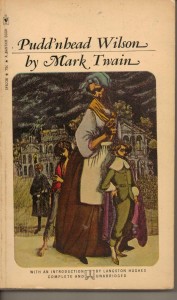Character: Thomas Driscoll
Source Text: Twain, Mark and Sidney E. Berger. Pudd’nhead Wilson and Those Extraordinary Twins: Authoritative Texts, Textual Introduction and Tables of Variants, Criticism. New York: Norton, 2005.
Entry Author: Jonah Beukman
Mark Twain’s Pudd’nhead Wilson satirizes a culture in which titles and nobility hold significant value. The dominant culture in the novel, which is one of affluence and “whiteness”, is proven to be superficial and false. Twain indicts a society that equates whiteness with nobility and blackness with bad character and complicates this notion with Thomas Driscoll, who is mixed race; his identity is not fixed and his malevolence as a character cannot be linked to biological determinism. Both Tom and his brother Chambers are one-thirtysecond white, yet Chambers is made out to be a benevolent character, whereas Tom is seen as wicked. His role in the social and societal settings of the novel is that of an antagonist, seen mostly in the act of selling his mother, Roxana, down the river as a slave. Yet he is not entirely unsympathetic, and Mark Twain complicates the notion of Tom’s “wicked” identity being due to his race. Tom’s identity as a mixed-race character is put into question in the following passage:
It was the “nigger” in him asserting its humility, and [Tom] blushed and was abashed. And the “nigger” in him was surprised when the white friend put out his hand for a shake
with him. He found the “nigger” in him involuntarily giving the road, on the sidewalk, to the white rowdy and loafer. When Rowena, the dearest thing his heart knew, invited him
in, the “nigger” in him made an embarrassed excuse and was afraid to enter and sit with the dread white folks on equal terms. The “nigger” in him went shrinking and skulking here and there and yonder, and fancying it saw suspicion in all faces, tones, and gestures (49).
Mark Twain puts into question several dichotomies here which relate to mixed-race and mixed identity. He satirizes the notion that being black is synonymous with being meek and unassertive, while complicating Tom’s actions as a character. “The ‘nigger’ in Tom” refuses to acknowledge white individuals. He “involuntarily gives the road” to white individuals who are not necessarily worthy of his respect as an act of deference. The word involuntarily suggests that at least part of Tom’s identity is inherent regardless of race, despite Twain’s false and superficial claim that “blackness” is on par with being evil. Tom also refuses to accept Rowena, “the dearest thing [that] his heart knew” inside, indicating that his black identity satirically informs sexual meekness as well. Tom goes “shrinking and skulking here and there and yonder” as a further indicator of Twain’s indictment of the waywardness of Black individuals. Black individuals may be wayward, according to Twain, but Tom’s mixed race and his acknowledgment of the dual identities that comes from both his “white” and “black” identities make him a character that defies the status quo. Twain himself defies the status quo as an author here through Tom’s duality in identity, which represents a prototype in post-structuralist thought

